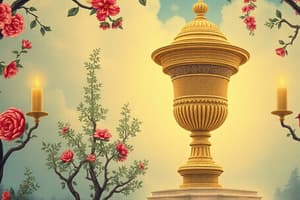Podcast
Questions and Answers
What does the speaker mean by 'Heard melodies are sweet, but those unheard are sweeter'?
What does the speaker mean by 'Heard melodies are sweet, but those unheard are sweeter'?
- Only sweet sounds should be played.
- Actual melodies are more important than imagined ones.
- Imagined experiences can be more profound than reality. (correct)
- Real emotions are inferior to imaginary feelings.
What does the phrase 'Bold Lover, never, never canst thou kiss' imply about the nature of desire?
What does the phrase 'Bold Lover, never, never canst thou kiss' imply about the nature of desire?
- Desire is often unattainable and elusive. (correct)
- Love is a fleeting emotion.
- Desire can always be fulfilled.
- Achieving love brings immediate satisfaction.
How does the imagery of 'happy boughs' contribute to the poem's overall themes?
How does the imagery of 'happy boughs' contribute to the poem's overall themes?
- It underscores the transience of human youth.
- It suggests that nature is indifferent to human emotions.
- It represents the permanence of joy and beauty. (correct)
- It highlights the inevitability of loss in life.
What is suggested by the phrase 'Who are these coming to the sacrifice?'
What is suggested by the phrase 'Who are these coming to the sacrifice?'
What role does 'the mysterious priest' play in the imagery of the poem?
What role does 'the mysterious priest' play in the imagery of the poem?
What does the speaker mean by 'Cold Pastoral' in the context of the poem?
What does the speaker mean by 'Cold Pastoral' in the context of the poem?
In the line 'Thou, silent form, dost tease us out of thought', what does 'tease us out of thought' imply?
In the line 'Thou, silent form, dost tease us out of thought', what does 'tease us out of thought' imply?
What overall message does the poem convey through the concept of beauty and truth?
What overall message does the poem convey through the concept of beauty and truth?
What imagery is portrayed by 'a friend to man, to whom thou say'st'?
What imagery is portrayed by 'a friend to man, to whom thou say'st'?
What does the phrase 'For ever warm and still to be enjoy'd' suggest about the nature of love in the poem?
What does the phrase 'For ever warm and still to be enjoy'd' suggest about the nature of love in the poem?
Flashcards are hidden until you start studying
Study Notes
Ode on a Grecian Urn
- The poem is an ode to a Grecian urn, a vase with scenes depicting a pastoral (rustic) life.
- The speaker addresses the urn as a "bride of quietness" and a "foster-child of silence," highlighting its stillness and timelessness.
- The urn is described as a "sylvan historian" capable of telling a "flowery tale" better than any poem.
- The urn's imagery depicts a scene of pursuit and escape: a "mad pursuit," "pipes and timbrels," and "wild ecstasy."
- The sounds of music are described as "heard melodies," and the melodies that are not heard are said to be "sweeter."
- The speaker suggests that the music is played "not to the sensual ear, but, more endear'd, / Pipe to the spirit ditties of no tone."
- The speaker addresses a "fair youth" and a "bold lover" involved in the scene, implying that the pursuit will never reach its end.
- The poem addresses the urn's ability to depict eternal love, as the "fair youth" will always love and the "bold lover" will always pursue.
- The speaker describes the urn as "happy," as it can experience eternal spring and beauty.
- The speaker addresses the urn as "happy melodist" and "happy love," suggesting that the love depicted on the urn is untroubled and complete.
- The speaker contrasts the eternal love on the urn with the "breathing human passion" that is "high-sorrowful and cloy'd," leaving behind a sense of sadness and emptiness.
- The poem moves on to depict a scene of sacrifice, questioning the purpose and motivations behind it.
- The speaker asks about the fate of the “little town” from which the people leading the sacrifice departed.
- The speaker describes the urn as an "Attic shape" and a "fair attitude," highlighting its beauty and form.
- The urn is presented as a source of "Cold Pastoral," meaning a serene and unchanging representation of rural life.
- The speaker describes the urn's ability to "tease us out of thought" and "doth eternity," referring to its timelessness and ability to prompt contemplation.
- The speaker states that the urn's beauty transcends time, and will remain a "friend to man" even when "old age shall this generation waste."
- The urn's message is summarized as "Beauty is truth, truth beauty,—that is all / Ye know on earth, and all ye need to know." The poem concludes by highlighting the interconnectedness of beauty and truth.
Studying That Suits You
Use AI to generate personalized quizzes and flashcards to suit your learning preferences.




